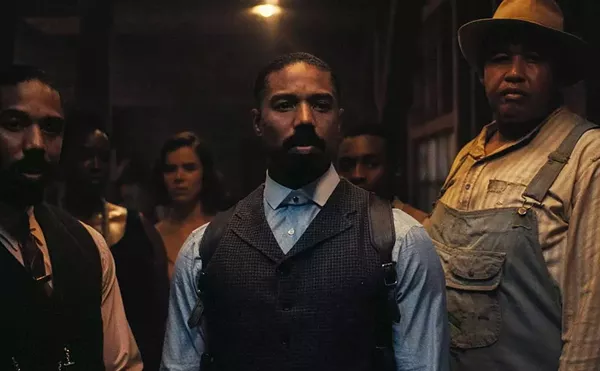
Audio By Carbonatix
[
{
"name": "GPT - Leaderboard - Inline - Content",
"component": "35519556",
"insertPoint": "5th",
"startingPoint": "3",
"requiredCountToDisplay": "3",
"maxInsertions": 100,
"adList": [
{
"adPreset": "LeaderboardInline"
}
]
}
]
In writer-director Jim Jarmusch’s spiritual meditation on the outlaw life, it’s only fitting that a hit man follows a philosophy which asserts, "meditation on inevitable death should be performed daily ... and every day without fail one should consider himself as dead."
Ghost Dog (Forest Whitaker) is a man out of time. A killer for hire who resides in an urban war zone, he’s a devotee of the warrior ethic expressed in The Hagakure: The Way of the Samurai, a Japanese text from the early 1700s. Through rigorous self-discipline and solitary meditation, Ghost Dog has found an inner life which not only nourishes him, but provides a framework for reconciling his contradictory existence.
On retainer to Italian mobsters, Ghost Dog is called in when internecine disputes turn deadly. But despite his value to the crime family headed by Ray Vargo (the dead-eyed Henry Silva) as an efficient and stealthy assassin, he remains an outsider. So when he kills a "made" man (more valuable than a mere mortal), Ghost Dog comes up against an arcane code of conduct which dictates he must be eliminated. He understands the motivation behind the actions, but this doesn’t mean he’ll go down quietly.
Since 1984, when his second film, Stranger Than Paradise, helped galvanize the American independent film scene, Jim Jarmusch has established himself as a deadpan auteur whose movies are comprised of comic misfits baffled by their inability to connect with the world around them. Within that off-kilter sensibility, there has always been a Zenlike simplicity and elegance, and that aspect of Jarmusch’s work reaches full fruition in Ghost Dog: The Way of the Samurai. Here, his central character is outside society but fully at home in his own skin.
The ursine Forest Whitaker is ideal as a man who embodies force and power, yet understands that violence is merely one aspect of his nature. For Ghost Dog, death is not just an inevitability, but serves as a guideline for embracing life.
Serena Donadoni writes about film for the Metro Times. E-mail her at letters@metrotimes.com.





